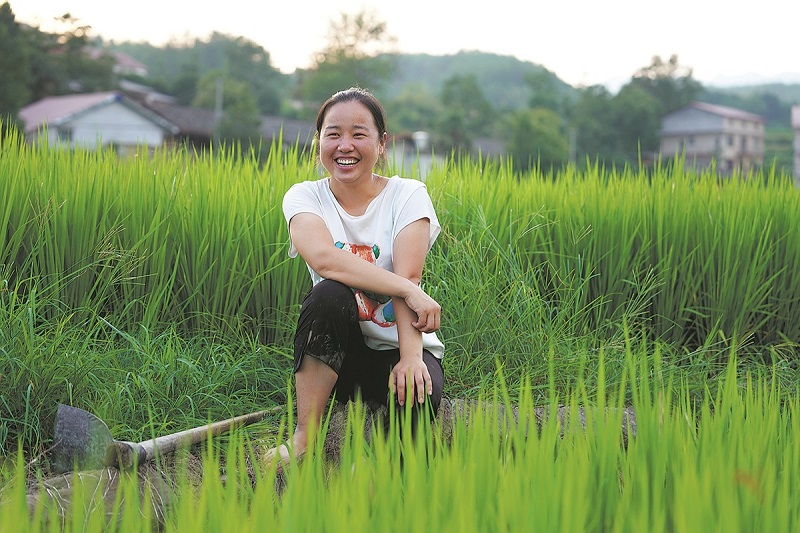Deputy brings farmer's voices to 'two sessions'

Ning Fenfang takes a break in a paddy field in Cili county, Zhangjiajie, Hunan province. CHINA DAILY
Unlike most of her peers who left their rural hometowns to find work in big cities, 34-year-old Ning Fenfang left her job in Hangzhou, Zhejiang province, in 2017 and now farms more than 66.7 hectares of land.
Ning, a member of the Tujia ethnic group, is from a mountainous village in Cili county in Zhangjiajie, Hunan province. She rents her farmland and hires villagers to work it. More than 300 housewives have worked part-time on her land, making more than 10,000 yuan ($1,389) per year.
Ning was elected as a deputy to the 14th National People's Congress last year, which has motivated her to continue her farmwork.
The central authorities have often stressed the importance of "holding the rice bowl firmly in our own hands", meaning that farmers should work harder to make sure their farmland is not wasted, she said. "NPC deputies from the grassroots need to consider rural farmers' needs and bring their voices to the two sessions," she said.
During this year's annual gatherings of the NPC and the National Committee of the Chinese People's Political Consultative Conference, Ning will suggest including greenhouses in agricultural insurance plans, as recent freezing rains battering her hometown have destroyed many of the structures.
Although her daily life is centered around farming and agriculture nowadays, Ning said it is very rare for young people to become farmers in rural areas.
In 2012, Ning left her hometown to take a sales job in Hangzhou. She returned in 2017 to look after her mother and grandmother, both of whom were ill, and started working as a village official a year later.
While working in the village, she found that with many young people leaving to work in cities, much of the farmland had been deserted.
In 2020, Ning decided to resign from her post in the village and become a full-time farmer, growing rice and rapeseed.
However, as she knew little about farming, it was much more difficult than she imagined.
"The heat and scorching sun were the first things I had to deal with. I could not open my eyes because I was sweating so much, and although I was covered in ultraviolet lightproof clothing, my skin started to peel due to sunburn," she said.
Ning also experienced tremendous pain in her neck and back due to the intensive labor.
At first, she didn't farm much and her investment was low, so she didn't feel very pressured to succeed. But in 2021, she spent 79,000 yuan on a plowing machine and decided to expand the scale of her farmland. "I did not tell my husband about buying the machine, as I knew he would not agree," Ning said. "He did not speak to me for several months."
Ning's husband was running a small business in Zhangjiajie at the time. Eventually, he returned to the village to help her with the farmwork, but he said he would only stay for several months before returning to his business in the city.
However, as Ning was starting to increasingly invest in the farmland, he ultimately decided to give up his business and remain in the village to work with her.
Ning later bought more agricultural machines and even an unmanned aerial vehicle to help with the farming as she continues to rent more land. "I have invested millions of yuan in farming, and most of the money is borrowed from banks, families and relatives, so there is no turning back," she said.
She also founded a center for housewives in the village to work her farmland during busy hours. She pays the villagers every day for their work. She also plans to explore the agricultural tourism resources in Zhangjiajie so that children living in cities can experience farming.
- Top legislature schedules standing committee session for late February
- China's top legislator meets with Uruguayan president
- Senior legislator surveys Anhui on formulating outline of provincial 15th Five-Year Plan
- China's top legislator meets with British PM
- NPC deputies see more engagement with top court



